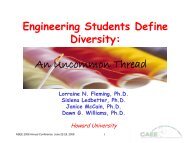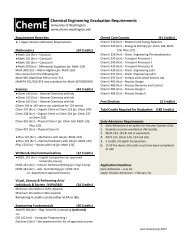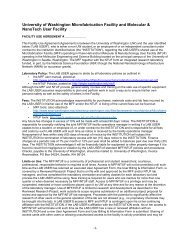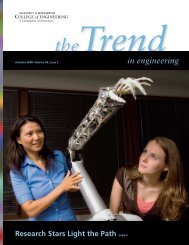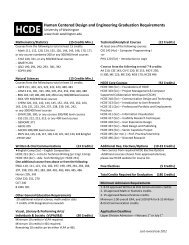You also want an ePaper? Increase the reach of your titles
YUMPU automatically turns print PDFs into web optimized ePapers that Google loves.
From Schema to StereotypesA PEERs Presentation By:Ahl Ashley, Cezanne,Kuei-Ti, Rachel,Rafael, Trick
Talent, Hard Work, and GritWhat determinnes intelligence
TalentDefinition: iti A natural ability oraptitude, gotten but notearned. In other words, abilities brought by genes.The common definition: Abilities thought of by most peopleas natural.Ex. Good sight, logical thoughtt process, comprehension ofmath concepts, and etc.
HardWorkDefinition: iti Efforts and perseverance.Ex. Spending time reading books and articles, exercising,understanding scientific theories, and etc.
" Over time I cameto understand aframework in whichh you could relishsomething that sommeone else wasconsidering a failure "-Carol Dweck, Stanford University•Dweck made this observation in a studyabout a little boy whho believed failure wasa challenge he loved to face; an unusual butmotivating attitude.
Intelligence• Growth Mindset > FixedMindset• Growth mindset: the notion that intelligence isdeveloped d rather than something you are bornwith• Fixed mindset: the lackof motivation duringstruggles• The brain can be thought of as a computer
Further Studieson Intelligence• Two studies in the NewYork City public schoolsystem conducted• Both studies showed thhat students t whoendorsed a strong growth mindsetoutperformed those that held a fixed mindset• Taught students that the brain is a muscle, thatbecomes stronger r and develops new connections.cti ns
Diversity &Intelligence• Dweck and others thenfound a parallel trend:o growth mindsets no gender gaps in mathand scienceo fixed mindsets favored boys in math andscience• Takeawayo Growth mindsets canhelp girls achieve inSTEM fieldso Even the greatest t minds faced struggles
Grit• Definitiono Perseverance and passion for long-term goals• A more accurate predictor of success thanintelligence• A common trait among world-classexperts and geniuses
Embracinng Failure• Grit can be developed and taughto Individuals can learn thevalue of effort and ofstruggle• Failure as an opportunity to learn• Currently, the develoopment of grit isdifficulto Society praises peoplefor success that requires theleast amount of efforto Struggling is often perceeived as a weakness
What CanWeDo?• Praise effort and hard work• Teach people p that mistakes and failuresare chances to learnand struggle is notsomething to avoid• Help cultivate a sense of optimism andpersonal motivationo Encouraging individualsto sustain their ownpassion for a subject will encourage them to investeffort in their interest
Biology and SocializationHow differentenvironmentalfactors influence our decisions
Case Study• 298 families with preschooland young elementary schoolchildren videotaped while using interactive scienceexhibits in a museum• Interested in how parents interacted with a single childwhile visiting the exhibits• Looked at whether the pareents explained an exhibit,gave directions at that exhibit, or talked about evidence
Findings• boys and girls equally likely ltalk about evidenceto be given directions and• boys 3x more likely than girls to hear explainations fromtheir parents• Explaination: parents talked about casual connectionswithin the exibit interface ie i.e. "when you turn that fast,it makes more electricitiy" (hand-cranked generator)
Differences between Boys v. Girls Interactions
Significance of Case Study• parents could be creating a gender bias in sciencelearning years before a child's first classroom scienceinstruction• the explanation from parents shapes what children learnfrom such activities which leads to a deeperunderstanding in science and perhaps a deeper interestin science• boys are more encouraged from parents to engage g inscientific reasoning
Early Gender SchemaAdults feel they need to know their child's sex because the label helpsthem interpret their child's behaviorand physical features.• Parents usually refer to their • Parents usually refer to theirnewborn daughters as "pretty" newborn son as "handsome" orand/or "sweet""happy""• A father is more likely to give his • A father is more likely to give his sondaughter a doll, than a truck a truck than a doll• When a baby girl cries, adults see •When a baby boy cries, adults seethe crying as, "Please feed me" the crying as angrier/ "Feed me• Congratulation cards for a baby girl now!!"are almost always more pink with • Congratulation cards for a baby boyrattles, rabbits, with a picture of a are almost always more blue withbaby sleepingbears, sports equipment with a• When comparing a baby boy and picture of a baby active.girl, a mother would say their build •When comparing a baby boy and ais the similar with the girl being girl, a father would say their son isa little softerbigger/more firm and more stronger,coordinated and alert.
Household Chores/SuggestionsVisible to parents: The differenInvisible ibl to parents: How differeently they treat their children• The toys that boys get than girls don't, or vice vera could lead to their interestin future careers.• A boy or girl's preference for certain toys can develop at the age of one, if theyare initially given certain types of toys• These lead to a gender schema/stereotype• A girl playing with a truck or a boy playying with a doll can be considered"culturally deviant"• As adults statistic found that women do more household chores than men evenwith equal careers and education. (Haveyou ever seen an article asking How DoMen Raise Kids and Manage to Work?")Suggestions:t types of toys they give their children• Split chores around the house• Buy toys all kinds of toys for your soon and/or daughter• Make less gender bias Congratulation cards (if you work in card making)
Can we declarre victory forwomen in theirparticipationpat in science?Not yet...
Uneven Increasee in Participation• In 1966, women earned 1/4men.of the Biology degrees as• By 2007, women began to outnumber men, taking 60% ofthe Biology degrees.• In Physics, the degrees given to women rose from 14%to 21%.
Why SoUneven?• Do women believe they canelsewhere?• Recent studies show minimai al difference in Physics-related abilities.have a stronger impact• Or is it because women don't see how science fits withtheir desire to work with peeople?• Is it even their choice...?
Early Influence• As early as 8th grade, signss of interest t in sciencereflect further education inscience.• Students with high confidence in their ability to acheivetend to grasp Physics more aptly.• Parents, teachers, and peers influence a child's selfconfidence. As shown earlieer, the gender bias thatpushes women away from science starts at a very youngage.
Solutions• Early influence: Cutting edgge labs, up to date text t books,and peer teaching opportunities.• Female role models in science, collaborative group work,and discussing the lives of female scientists.
"Where, after all, douniversal human rightsbegin?...In small places,close to home...Such are theplaces where every man,man , and child seeks equaljustice, equal opportunity,equal dignity."~ (1958) Eleanor Roosevelt



